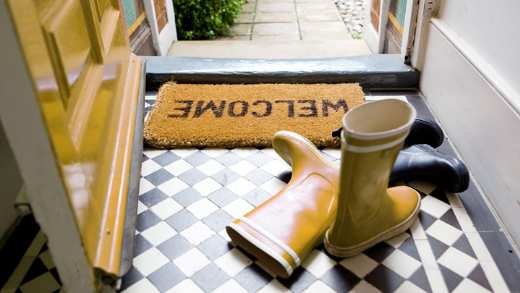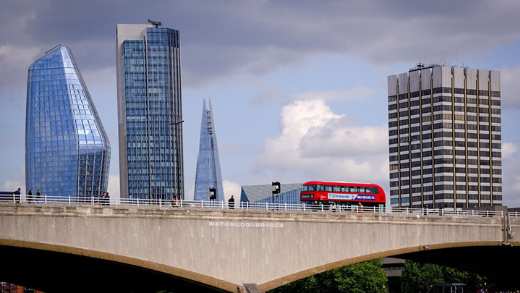
Employers urged to get back to business plans in place and seek expert help where needed
- Half (49%) of workers feel positive about a return to work
- Support for employers with 61% of those returning to work believing their employer will put right safety measures in place
- But 35% of those who do not believe their employer will do enough to make their work environment safe say they won’t return
- Infection, social distancing and travel are among employees’ top concerns
- Older workers are most concerned about the risk of infection
- Younger workers say they are confused by the communications on social distancing
- Construction workers are among the most concerned of being infected by Covid-19
- Regional, age and industry differences show the complex impact of Covid-19 on communities
Half (49%) of employed British adults feel positive about the prospect of returning to their place of work after lockdown, with less than one in five (18%) feeling negative, an Aviva study shows*.
The findings paint a relatively positive picture for businesses that have supported their people through lockdown, such as regularly communicating with workers and taking necessary steps to manage the risk of infection in the workplace. However, where businesses have not embraced risk management and prevention strategies, employees may decide not to return to work at all.
Further, it is clear that there is a long way to go before businesses are compliant with the practical guidance from the government to make work safe for employees and customers.
Safety first
The survey of more than 2,000 employed adults working in the UK found that 61% of those returning to work believe their employer will make the work environment safe to return to. However, in a clear warning to businesses that don’t put safety first, the survey found that 35% of employees returning to work don’t trust their employer to make the workplace safe and may not return to work for their employer.
Top concerns for employees returning to work
For workers who feel neutral or negative about returning to work, infection remains workers’ top concern as they come back to their place of work. Whether from colleagues (44%) or customers (33%), employees are most concerned about virus transmission in the workplace, which underscores the need for employers to embrace clear prevention strategies to protect their people and the public.
By Age
Coronavirus has affected everyone in different ways, depending on a number of factors including age, industry, and geography. For example, only 29% of 16 – 24 year olds said they were concerned about the risk of being infected by colleagues, compared to 44% across all age groups. Infection concerns increased consistently by age group, with those over 55 most concerned (49%).
Conversely, employees over 55 were the least concerned about the impact of lockdown on their mental health (7%). This compares to 21% of young employed people who said the changes under lockdown affected their happiness.
However, the biggest concern facing young people returning to work is confusion and a lack of communication over social distancing (39%). Underscoring the importance of communication, young people were also the most critical of communication from their employer, with just 14% rating communication with their employer as ‘excellent’ – well below the average response of 25% who rated employer communication as ‘excellent’.
The confusion voiced by young people in this survey shows that employers have a clear need to regularly communicate with all of their workers about their return to work and to keep them informed of the safest ways of working, including how to manage social distancing in the workplace.
By Region
Where we live also affects our attitude to returning to work. Aviva’s research shows that the greatest concern for Londoners returning to work wasn’t the workplace itself, but getting there. Concern about commuting by public transport was noted by nearly half (47%) of all respondents in the Greater London area, more than any other area of concern.
Employees’ concern of catching COVID-19 from colleagues varied widely by location. Compared to the national average across workers from all regions (44%), workers in or around Plymouth (57%), Norwich (55%) and Cardiff (55%) were the most concerned about infection from colleagues, while those in Nottingham (34%), Southampton (37%), and Newcastle (38%) registered the lowest concern.
By Industry
Attitudes towards risk equally varied across industry sectors. Healthcare workers, who were some of the heroes emerging from lockdown, showed admirable positivity in the face of danger, recording the lowest levels of personal concern with regards to infection from colleagues (38%), compared to other sectors in the survey. They also had a relatively low score for concern of infection from patients (34%).
The industry most concerned about infection from colleagues was the sector that included construction, at 60%. Workers were understandably concerned as their jobs are physically demanding and frequently require the need to shout over loud noise – both thought to be contributory factors to the spread of the virus.
Chris Andrews, Head of Risk Management Solutions at Aviva, commented: "As Britain gets back to business after lockdown, employees want to know that their employers have taken all the necessary steps, and what those steps are. That means not just taking action but engaging with employees on their concerns and clearly communicating what is in place and addressing anything that remains unresolved.
"Our research shows that the biggest employee concern for returning to work is infection from colleagues and customers."
"Risk management and prevention strategies, once perceived as red tape, are now essential for businesses in order to keep their people and their customers safe as they open their doors again. Whether devising safe working conditions in a factory, or ensuring orderly social distance in a retail setting, businesses need to consider how they will minimise the risk of infection for their employees and their customers."
How have businesses made work safer?
In Aviva’s survey more than 2,000 employed UK adults were asked about their attitude towards returning to work. Of these, 42% spent lockdown working from home, 26% continued to work in their usual place of business, 21% were furloughed and 6% continued to work in different locations in a key trade (e.g., plumber, electrician, etc.). A further 5% were not working and not on furlough.
Of the workers that continued to work in their usual place of business, or continued to work at different locations, 80% said that their employer had taken some steps to improve their safety, and the safety of customers entering the premises.
The top three changes implemented by businesses were easy access to hand-washing and hand sanitiser (65%), reducing the number of employees and/or customers allowed in the workplace (50%) and sign-posting traffic flow through the premises to support social distancing (42%).
While welcome, this shows that many businesses still have a long way to go to fully comply with the government’s five point plan for safely returning to work and being Covid-Secure. Below we’ve compared the government’s plan against how many employees said their employer had taken these measures:
Comparison of government plan against how many employees said their employer had taken these measures
Government’s ‘5 key points’ | Proportion of workers who said their employer had implemented the measure | ||
1. Help people work from home | 42% of employees surveyed said they were working from home | ||
2. Carry out a COVID-19 risk assessment, in consultation with workers or trade unions | Did not ask, as not all workers may know if a risk assessment was carried out and so results would not be valid | ||
3. Maintain 2 metres social distancing, wherever possible | 42% of those working in their normal workplace said their employer had taken measures to improve social distancing | ||
4. Where people cannot be 2 metres apart, manage transmission risk | 40% of those working in their normal workplace said their employer had taken measures such as erecting screens or barriers between workers and customers | ||
5. Develop cleaning, handwashing and hygiene procedures | 65% of those working in their normal workplace said their employer provided easy access to hand-washing and hand sanitiser | ||
Andrews continued, “It’s good to see from our survey that most employees say their employer has brought in some of these measures. But it is equally clear that not enough businesses are following all five basic points of the government’s guidance for employers. The risk of not adopting the government’s measures is the spread of the virus, a return to lockdown either locally or nationally and long-term impacts to UK PLC. We must not let that happen.
"This is a time to be absolutely focused on prevention and attentive to the needs of employees as they return to work."
“Many businesses may have very specific operational requirements, and expert advice may be the best course of action for them. We encourage businesses to seek expert risk management advice as they emerge from lockdown to ensure they are taking the necessary steps to protect people. Not only will this build confidence amongst employees and customers, but it will equally minimise the risk of infection and related claims for liability.”
*All data is taken from a survey of 2,024 employed adults (aged 16+) across the UK, conducted by Censuswide Research from 26 – 30 June 2020, on behalf of Aviva.
-ENDS-
Media enquiries
Erik Nelson
Motor Insurance and Compensation Culture, Fraud and Data
-
Phone
-
+44 (0) 7989 427086
-
-
Email
Notes to editors:
- We are the UK's leading diversified insurer and we operate in the UK, Ireland and Canada. We also have international investments in India and China.
- We help our 19.2 million (as at 31 December 2023) customers make the most out of life, plan for the future, and have the confidence that if things go wrong we’ll be there to put it right.
- We have been taking care of people for more than 325 years, in line with our purpose of being ‘with you today, for a better tomorrow’. In 2023, we paid £25.6 billion in claims and benefits to our customers.
- In 2021, we announced our ambition to become Net Zero by 2040, the first major insurance company in the world to do so. We are aiming to have Net Zero carbon emissions from Aviva’s operations and supply chain by 2030. While we are working towards our sustainability ambitions, we recognise that while we have control over Aviva’s operations and influence on our supply chain, when it comes to decarbonising the economy in which we operate and invest, Aviva is one part of a far larger global ecosystem. There are also limits to our ability to influence other organisations and governments. Nevertheless, we remain focused on the task and are committed to playing our part in the collective effort to enable the global transition. Find out more about our climate goals at www.aviva.com/climate-goals and our sustainability ambition and action at www.aviva.com/sustainability
- Aviva is a Living Wage, Living Pension and Living Hours employer and provides market-leading benefits for our people, including flexible working, paid carers leave and equal parental leave. Find out more at https://www.aviva.com/about-us/our-people/
- As at 31 December 2023, total Group assets under management at Aviva Group were £376 billion and our estimated Solvency II shareholder capital surplus was £8.8 billion. Our shares are listed on the London Stock Exchange and we are a member of the FTSE 100 index.
- For more details on what we do, our business and how we help our customers, visit www.aviva.com/about-us
- The Aviva newsroom at www.aviva.com/newsroom includes links to our spokespeople images, podcasts, research reports and our news release archive. Sign up to get the latest news from Aviva by email.
- You can follow us on:
- X: www.x.com/avivaplc
- LinkedIn: www.linkedin.com/company/aviva-plc
- Instagram: www.instagram.com/avivaplc
- For the latest corporate films from around our business, subscribe to our YouTube channel: www.youtube.com/user/aviva
















